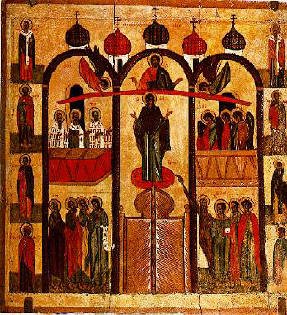
Why does the Church pray for the departed? Simple: because they, like us (or, better, along with us), have not yet experienced the full redemption of their beings, which will take place at the resurrection. The Church on earth, entrusted with the care of souls of all the faithful, pleads the mercies of God in solidarity with all of its members, both living and dead. This implies nothing at all about the "state" of the dead before the resurrection apart from the acknowledgement that BEFORE the resurrection neither they nor us have reached the goal, and reaching that goal depends completely and utterly on the mercy and grace of God.
Non-specificity characterizes the Church's prayers for the departed; that is, the Church does not pray for temporally-bound "needs." Rather, the Church prays for the departed within the general intercessions for the whole Church, that they, along with us, may share with all God's saints in his eternal kingdom. Someone might ask, what profit lies in such prayers for the departed? But one might just as well ask, what profit lies in such prayers for those of us who still live here on earth? One will find the same answer for both questions.
Non-specificity characterizes the Church's prayers for the departed; that is, the Church does not pray for temporally-bound "needs." Rather, the Church prays for the departed within the general intercessions for the whole Church, that they, along with us, may share with all God's saints in his eternal kingdom. Someone might ask, what profit lies in such prayers for the departed? But one might just as well ask, what profit lies in such prayers for those of us who still live here on earth? One will find the same answer for both questions.



